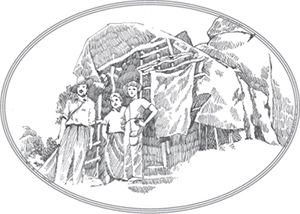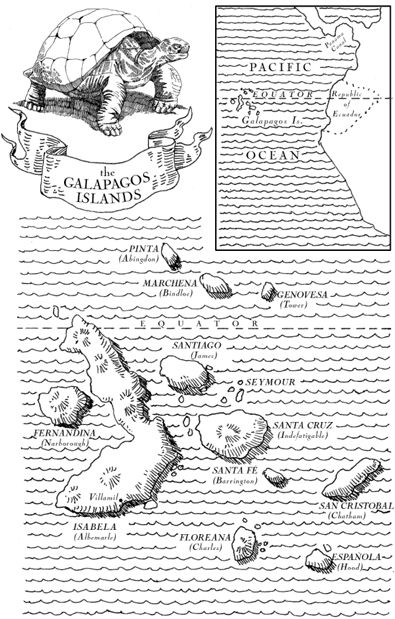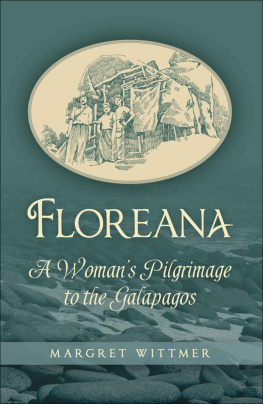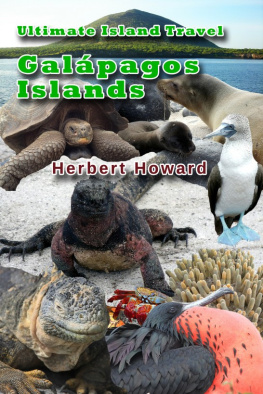Wittmer - Floreana
Here you can read online Wittmer - Floreana full text of the book (entire story) in english for free. Download pdf and epub, get meaning, cover and reviews about this ebook. year: 2014, publisher: Moyer Bell and its subsidiaries, genre: Home and family. Description of the work, (preface) as well as reviews are available. Best literature library LitArk.com created for fans of good reading and offers a wide selection of genres:
Romance novel
Science fiction
Adventure
Detective
Science
History
Home and family
Prose
Art
Politics
Computer
Non-fiction
Religion
Business
Children
Humor
Choose a favorite category and find really read worthwhile books. Enjoy immersion in the world of imagination, feel the emotions of the characters or learn something new for yourself, make an fascinating discovery.
- Book:Floreana
- Author:
- Publisher:Moyer Bell and its subsidiaries
- Genre:
- Year:2014
- Rating:3 / 5
- Favourites:Add to favourites
- Your mark:
- 60
- 1
- 2
- 3
- 4
- 5
Floreana: summary, description and annotation
We offer to read an annotation, description, summary or preface (depends on what the author of the book "Floreana" wrote himself). If you haven't found the necessary information about the book — write in the comments, we will try to find it.
Floreana — read online for free the complete book (whole text) full work
Below is the text of the book, divided by pages. System saving the place of the last page read, allows you to conveniently read the book "Floreana" online for free, without having to search again every time where you left off. Put a bookmark, and you can go to the page where you finished reading at any time.
Font size:
Interval:
Bookmark:
FLOREANA

A Womans Pilgrimage to the Galapagos
MARGRET WITTMER

Copyright 1989 by Margret Wittmer
Renewed 2013
REVISED SECOND US EDITION
All rights reserved. No part of this book may be reproduced in any form or by any electronic or mechanical means, including information storage and retrieval systems, without permission in writing from the publisher, except by a reviewer who may quote brief passages in a review.
Library of Congress Cataloging-in-Publication Data
Available on request
For inquiries about volume orders, please contact:
Beaufort Books
27 West 20th Street, Suite 1102
New York, NY 10011
sales@beaufortbooks.com
Published in the United States by Beaufort Books
www.beaufortbooks.com
Distributed by Midpoint Trade Books
www.midpointtrade.com
Printed in the United States of America
Cover design by Jane Perini
Interior design by Jane Perini
Illustrations by Tony De Luz
When Ritter and the Baroness have
turned to dust and Paradise and
Eden have sunk into smoking hell,
Wittmer will still be sitting in his
cosy little house smoking his pipe.
The sun will rise and set, and he
will forget to count the days.
- HAAKON MIELCHE

The Galapagos Islands have been considered and positioned as the living laboratory of evolution. It was here where, in 1935, a 25-year-old, young, and passionate Charles Darwin had the opportunity to collect samples and specimens that could allow him to, some twenty years later in 1859, publish his book On the Origin of Species by Means of Natural Selection, or the Preservation of Favoured Races in the Struggle for Life, generally known as On the Origin of Species. This landmark in the understanding of the natural world has given the Galapagos a worldwide recognition that is intimately bounded to science and research. Moreover, this living laboratory of evolution proved itself in top shape when starting in 1973, Peter and Rosemary Grant demonstrated the theory of evolution in animals so small and common in the islands like the Galapagos Finches. But the Galapagos Islands are a living laboratory in another aspect, not least important and even more complex: human beings. Those who arrived to the Galapagos in the beginning looking for a home, searching for a new homeland, are an example of this component; and those who wanted to profit from the islands and their resources, either for supplying their ships or to establish industrial, penal, or slave colonies are examples as well. The survival of the fittest and the adaptation to the environment were concepts that the early settlers had to learn and practice from the moment they landed on the islands, no matter their final objective. Very few of those entrepreneurships ended up successfully. Many of them failed because they lacked important adaptations for living in the Galapagos; these adaptations were mainly human values such as love for hard work, patience, family unity, and discipline. The rich natural and human history has given the Galapagos the capacity to be a world class tour destination. Our inherent curiosity to understand the world, the deep fascination that wildlife exerts in people gave the Galapagos the chance to become such a destination.
The inhabitants did the rest: develop a model.
Today, tourism is the main component of the Galapagan economy, and the model used for its management and distribution is analyzed daily in the islands. The Galapagos has proved once again a living laboratory of evolution in societies, of the creation of culture, and of the adaptation of settlers to the environment. The population in Galapagos is mainly immigrant. Some arrived in the nineteenth century, some between 1930 and 1850 like the Wittmers and other pilgrim families, some before 98, and for sure many have arrived today. No matter how, when, or why, all of us who are here today are immigrants or descend from them. The reason is very simple: the islands never had an aborigine population. The history of the islands is quite recent but has a lot of interest. It has proven that settlement entrepreneurships are successful depending on how those executing them relate with the environment; this validates Darwin theory, not only for the natural world but also for human societies. The Galapagos Islands are not what they were eighty years ago when Margret, Heinz, and Harry Wittmer arrived to Floreana in 1932. Today, the Galapagos has an estimated population of twenty (20,000) to twenty-five thousand (25,000) inhabitants. Connections with the mainland, both maritime and air, are guaranteed and many have criticized those as excessive. Cellular and conventional phone lines, radio, television, written press, and internet and social media are goods and services inhabitants consume avidly, even in the lonely and still somehow isolated Floreana. Today, a couple days are more than enough to have almost anything imported from Guayaquil or Quito; moreover, the corners, streets, and squares are very well fit with products of all kinds. The level of consumption of an inhabitant of the islands is equal to any other in mainland Ecuador; in some cases it is even superior. The needs and priorities that the first inhabitants once had are only anecdotes of a time that is not very distant but that is long gone. This book is a tribute to those first settlers that arrived to the islands.
The Galapagos Islands have seen many entrepreneurships along their short and passionate human history; very few of those have been able to sustain in time and flourish. The Wittmer family in Floreana is one of these few.
The book Floreana, written by Margret Wittmer, is the testimony of this familys entrepreneurship. They inhabit and love the islands to this day. This book was first published in 1959 and has been translated into more than 14 languages along the years. The story of the Wittmers of Galapagos and the mysteries of Floreana have traveled around the world; the stories told have created a lot of interest and visitors to the islands.
This book and the events narrated in it have raised interest and study of world renowned historians and researchers. Like every great story, it has generated versions and reactions on those who were not there at the time, but that feel smart enough to make assumptions and even affirmations, about events they did not witness.
The real value of the story in this narration goes further than the novel interest of it. The mystery, disappearances and eccentric characters give the book a nice touch and make the story a thriller. But the main storyline here is the account of hard work, family values and love for ones homeland. This is the legacy that Margret Wittmer leaves for those of us who knew her, for those of us who lived the wonderful woman. This book is also a message for all the inhabitants in the Galapagos at this time.
With a Galapagan culture in process of formation; a task that proves more complicated with the global culture we live today, and under the economic and social models that rule the islands; the task of evolving to a local culture seems very complicated. Even though the values presented in this book are universal, and create value to the reader no matter your origin, it is fundamental that this book becomes a guide for today and tomorrows Galapagans. We will find keys in this book that will help us survive trough evolution.
Next pageFont size:
Interval:
Bookmark:
Similar books «Floreana»
Look at similar books to Floreana. We have selected literature similar in name and meaning in the hope of providing readers with more options to find new, interesting, not yet read works.
Discussion, reviews of the book Floreana and just readers' own opinions. Leave your comments, write what you think about the work, its meaning or the main characters. Specify what exactly you liked and what you didn't like, and why you think so.





